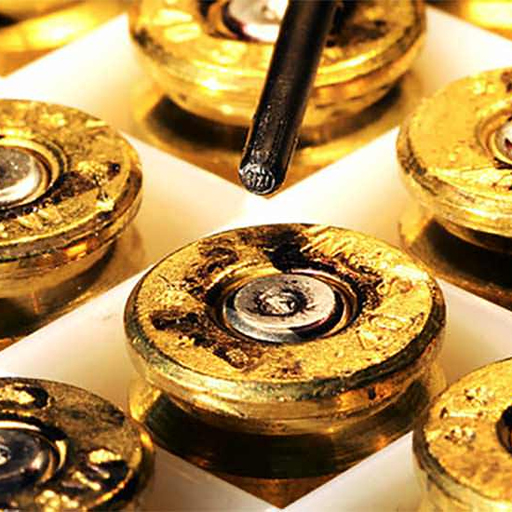Breaking: Appeals Court Says Lawsuit Challenging California’s Microstamping Law Can Proceed!

California’s Fifth Appellate District Court of Appeal issued a unanimous ruling on December 1st that constitutes a big win for supporters of Second Amendment rights in California and a significant setback against concerted efforts by lawmakers and bureaucrats to regulate handguns out of California.
Thanks to the hard-fought efforts of the National Shooting Sports Foundation, the appellate court overturned a lower court decision that had dismissed NSSF’s challenge to California’s arbitrary and irrational requirement that all new semi-automatic handguns be equipped with so-called “microstamping” technology. Under terms much more favorable to those fighting to abolish the microstamping requirement, the appellate court sent the case back to the lower court to re-decide the microstamping challenge. While this is not the end of the case, the appellate court’s revival of the case and ruling that the Attorney General’s interpretation of the law is wrong makes the plaintiffs’ case much stronger moving forward.
The legal challenge centers on a 2007 California law requiring that licensed firearm dealers could only sell semi-automatic pistols that contained “microstamping” technology – parts that would imprint on a cartridge ejected from a pistol a microscopic array of characters identifying the make, model, and serial number of the specific pistol that had fired the cartridge. That 2007 microstamping law finally took effect in 2014 because the patent for such purported technology had previously been unavailable for use by manufacturers. Once that was no longer the case, California Attorney General Kamala Harris certified the microstamping technology as generally available and announced the requirement would be enforced immediately by the California Department of Justice.
Since the 2014 implementation of the microstamping law, not a single new semi-automatic handgun model has been sold by dealers in California because manufacturers simply cannot produce a form of microstamping technology in their pistols that meets California’s requirement. Californians are stuck buying out-of-date, previous generation pistols from an ever-dwindling DOJ-approved handgun roster. Because of the inability of Californians to have access to the latest technology in the same safe and reliable handguns that are available to the rest of the nation, NSSF filed a lawsuit claiming California’s microstamping requirement is illegal under a California statute prohibiting laws that impose impossible conditions.
In defense, the Attorney General not only asserted that the technology was viable, but also that the law’s requirement that a microstamp be made in “two or more places” on the spent cartridge could be satisfied if manufacturers made pistols with parts such that both microstamps came from the firing pin, a much less onerous engineering task for pistol manufacturers. On these bases, the Attorney General asked the lower court to dismiss NSSF’s lawsuit, which the court did.
Fortunately, the appellate court disagreed with the Attorney General’s claims. First, the court said it must accept as true NSSF’s allegation that implementing “microstamping” technology is impossible at this stage of the lawsuit and allow NSSF to proceed to prove that with evidence. Second, the court said the Attorney General’s claim that the “two or more places” microstamping requirement can be satisfied by manufacturers designing pistols to have two stamps come from the pistol’s firing pin is contrary to the language of the law.
This second determination by the court of appeal is very important for the future of the lawsuit. While there appears to have been some limited success in producing microstamps from characters engraved on the firing pin, there has been little, if any, success in engineering a pistol to reliably produce a microstamp anywhere else on the cartridge. This bolsters NSSF’s claims that compliance with the “microstamping” requirement under the law as written is impossible, and thus makes success in this lawsuit when it is relitigated below much more likely.
The appeals court’s decision is an important win for all California gun owners. It shows that we can vindicate our rights in the courts, even if our politicians ignore them, and comes at a time when gun rights are under an unprecedented attack in California. This year, in addition to a deceptive ballot initiative that criminalizes law-abiding Californians, California gun owners were hit particularly hard with a deluge of anti-gun bills aptly dubbed “Gunmageddon.”
But, thanks to the efforts of conscientious gun enthusiast groups like NSSF, CRPA, Gun Owners of California, and the National Rifle Association, legal victories like these put us ever closer to rolling back the anti-gun bills passed by California legislators. Even with an anti-gun supermajority in the California Legislature, tortured, illogical, and arbitrary state laws like the microstamping law stand a greater chance of being successfully challenged in court if we continue to fight.
With NRA’s national election successes, NRA and CRPA are poised to continue the momentum from this recent win and plan to file several new legal challenges against the onslaught of recently-enacted unconstitutional California gun laws. And with the President-Elect set to change the face of the Supreme Court with his incoming administration, as well as a Republican-controlled national House and Senate, these challenges are poised to pay off for California gun owners, sporting arms enthusiasts, and defenders of the Second Amendment. So it is more important than ever for California gun owners to continue to work together to get these laws overturned.
California’s Fifth Appellate District Court of Appeal issued a unanimous ruling on December 1st that constitutes a big win for supporters of Second Amendment rights in California and a significant setback against concerted efforts by lawmakers and bureaucrats to regulate handguns out of California.

Leave a Reply